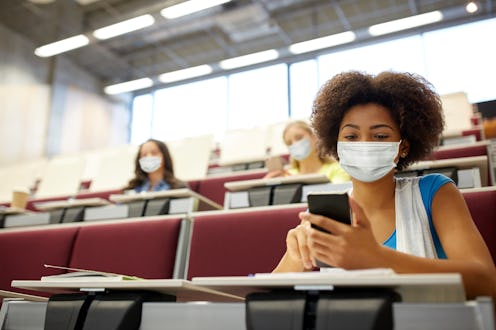Health
Can My University Evict Me If I Test Positive For Coronavirus?
What UK students should know about accommodation during the pandemic.

As universities begin reopening their doors, students across the UK are being faced with new challenges relating to COVID-19. Recently introduced guidelines and restrictions with respect to health and safety, course admissions, and beyond, are likely to impact all aspects of university life. However, in the era of track and trace and self-isolation, questions surrounding uni accommodation and where to reside during term time are more complex than ever before. So, what do university students need to know about accommodation during coronavirus?
As noted on the official UK government website, anyone showing symptoms of coronavirus should get tested when possible and self-isolate for at least 10 days. Those who test positive should also self-isolate for at least 10 days, starting from the day their test was taken. For students residing in halls of residence or private accommodation, these current government guidelines can be confusing, especially while living away from their usual home address.
Recent measures introduced by Trinity College Cambridge have thrown this subject into the spotlight once again and have highlighted why its imperative students become familiar with their rights and know the correct steps to take should COVID-19 become an issue for them.
As the Guardian reports, Trinity College Cambridge informed students living in the university's halls of residence that they could be "required to move, without help from college, to alternative college accommodation, or out of college, at very short notice" in the event of a COVID-19 outbreak, which actually goes against official guidance from the government. Keep reading to find out exactly what those guidelines say.
What should I do if I develop symptoms while studying?
The UK government's coronavirus guidance on isolation for residential educational settings advises that students who develop COVID-19 symptoms while living in halls of residence or houses in multiple occupation (HMOs) should "self-isolate in their current accommodation," adding that "universities and colleges should facilitate this." They should not leave the premises, as this could increase the risk of spreading the infection. Students are encouraged to contact their university or college, the manager of their halls — if they are privately owned — or the landlord of their HMO to discuss any concerns in the event of a coronavirus outbreak.
Will my university help me if I'm self-isolating?
Government guidance states that institutions and building managers of private halls are required to "design procedures with their staff to ensure that self-isolating students can receive the food and medicines they need for the duration of their isolation." However, students residing in houses of multiple occupation are advised to discuss their circumstances with "both their landlord and their institution, who should work in tandem to ensure that necessary support is in place."
What do I during the holidays?
The government have asked universities to operate a "non-eviction policy" to ensure students aren't required to leave halls of residence if their contract is up, if their rental agreement does not cover holidays, or if they're unable to pay rent — and this applies "whether students are self-isolating or not." Students living in houses of multiple occupation (HMOs) are also offered protection from eviction by new rules developed by the Ministry of Housing, Communities and Local Government.
What should I do if my university town goes into local lockdown?
In The Department for Education's coronavirus guidelines for higher education institutions, it states that, in the event of a local lockdown during term time, students should "remain in their current accommodation and not return to the family home, which would increase the risk of transmitting the infection."
Who do I talk to if my university is trying to unfairly evict me?
If university students have any concerns relating to how their chosen institution is handling aspects of the coronavirus pandemic, including accommodation, there are several ways of filing an official complaint. This includes notifying the Office for Students, complaining to a university or college directly, or contacting the Office for the Independent Adjudicator (OIA) for Higher Education.
This article was originally published on